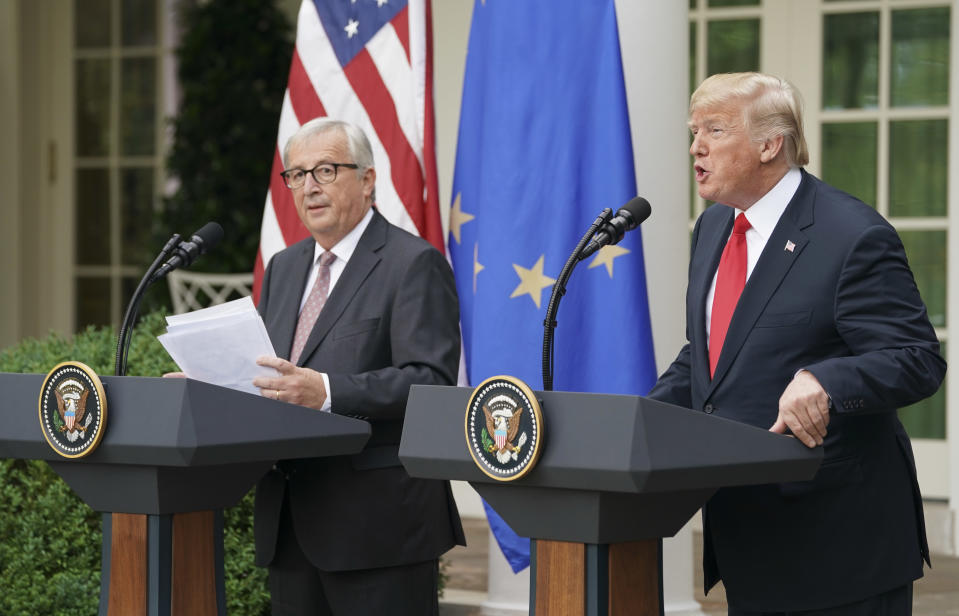What Germany and France are saying about the Trump trade truce
The day after President Donald Trump and European Commission President Jean-Claude Juncker made an unexpected agreement to hold off any trade tiff escalation, reaction around Europe was mixed.
The two leaders agreed to a 120-day delay on any new tariffs while investigations and negotiations can be carried out, a reprieve for the European (mainly German) auto industry that Trump threatened with a 25% tariff.
Juncker called it a “major concession” from Trump.
In Germany, the news was met with some fanfare: the German economic minister Peter Altmaier tweeted “Good news from the USA!” and “free trade and millions of jobs saved!”

The sentiment in the German press was chiefly surprise. Der Spiegel wrote that Juncker did what German chancellor Angela Merkel and French president Emmanuel Macron could not do, and pointed out that Trump had positioned the deal as if he had “invented the transatlantic relationship.”
“Escalation prevented, nothing more,” read one don’t-get-your-hopes-up column from Die Zeit, a popular newspaper that called Trump “extremely fact-resistant.” The article pointed out that it’s ridiculous to think without E.U. tariffs European roads would be filled with Chevys over Volkswagens.
But some of Juncker’s optimism is indeed felt. (A Deutsche Welle headline: “Relief in Germany over Trump-Juncker trade deal.”) Der Spiegel hypothesized that Europe’s targeting of Bourbon, soybeans, and Harley-Davidson likely had an impact given the coming midterms, and pointed to Trump’s aid plan for farmers that Republicans have panned.
Another Der Spiegel article noted three weaknesses in Trump’s trade strategy that reduce leverage: China’s massive holdings of U.S. debt, the retaliatory effects of tariffs and their effects on U.S. consumers, and the E.U. politicizing fines on U.S. companies, something that hasn’t happened yet but potentially could.
The Munich newspaper Suddeutsche Zeitung also raised two important questions: who is going to buy the soybeans that Juncker agreed to import, and who would pay for more expensive liquified natural gas over the cheaper pipeline alternative from Russia?
Not everyone is so happy
Different economies may present a tough sell for part of Europe.
“This [situation] could split Europe, as Germany would be by far the biggest loser of punitive tariffs,” Marcel Fratzscher, head of the German Institute for Economic Research, told Munich’s Suddeutsche Zeitung.
France, for example, which does not import large amounts of cars to the U.S., appears to be taking a much more critical eye, and will not accept a global trade deal.
Bruno Le Maire, France’s economic minister, tweeted, “It’s good to come restart dialogue with the Americans about commerce, but we need to make a few clarifications. Agriculture should be out of the field of discussion: Europe won’t compromise its standards!”
Le Maire said France is concerned about honoring Europe’s agricultural regulations, which are stricter than in the U.S. and are seen as assurances of quality, safety, and environmental health. He also noted he wants easier access to American public markets.
“Good commerce talks can only be done under clear grounds and not under pressure,” Le Maire said, likely referring to Trump’s threat of auto tariffs, which Der Spiegel called a “gun to the chest.”
If Trump and Brussels attempt a global agreement, France says it will not play along. In an article Europe 1 retweeted, Le Maire noted he doesn’t want another TTIP, the trade agreement between Brussels and the U.S. that started under President Obama and was later derailed.
–
Ethan Wolff-Mann is a writer at Yahoo Finance focusing on consumer issues, retail, and personal finance. Follow him on Twitter @ewolffmann.
How a temporary tariff can turn into a permanent price hike
EU lawmakers to Facebook’s Zuckerberg: ‘We have a big problem here’

